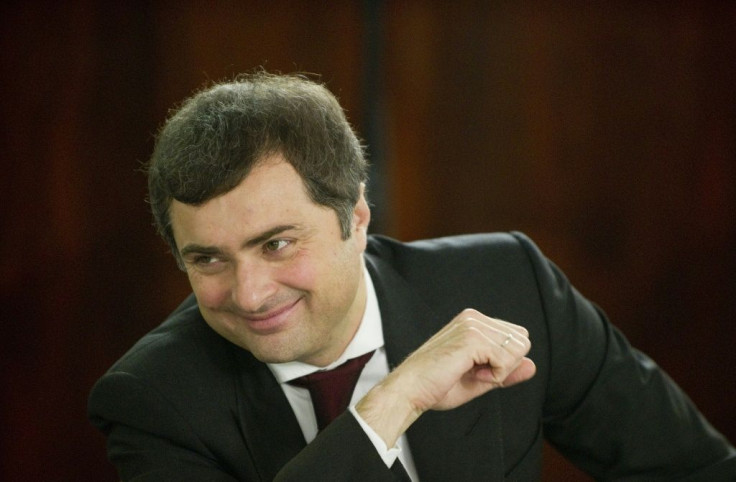Surkov: Ukraine Pointman And Putin's Ideologue
Vladislav Surkov, the Kremlin's chief ideologue and pointman on relations with Ukraine and Moscow-backed separatists, who was dismissed late Tuesday, was for many years viewed as one of Russia's most powerful men.
A hate figure among liberals, Surkov, 55, was credited with coining the term "sovereign democracy" to describe Russia's political system and once said God sent strongman Vladimir Putin to Russia.
In recent years, Surkov was in charge of Kremlin's Ukraine policy and cultivated close ties with the separatists who have carved out "people's republics" in the ex-Soviet country's eastern regions of Donetsk and Lugansk.
He entered the Kremlin during the last term of Russia's first president, Boris Yeltsin, in 1999, and has since been seen as a top architect of the political ideology underpinning Putin's 20-year reign.
In an article published last year, Surkov said "Putinism" was the ideology of the future and would outlive its creator.
"Putin's big political machine is only kicking into gear and getting ready for long, difficult and interesting work," he wrote in the Nezavisimaya Gazeta daily.
As first deputy head of the Kremlin administration, Surkov helped transform the Russian parliament into a rubber stamp, muzzle media and neuter the opposition.
The secretive strategist oversaw political parties in parliament and electoral campaigns that invariably handed victory to Putin.
To counter the threat of so-called "colour revolutions" which brought to power pro-Western regimes in Ukraine and Georgia, Surkov masterminded the creation of pro-Kremlin youth groups which harassed Western diplomats and the opposition.
Surkov saw his influence wane after he was moved to the government in a reshuffle in 2011 and served two years in the rank of deputy prime minister.
In 2013, he returned to the Kremlin where he served as Putin's advisor in charge of ties with Ukraine and other post-Soviet countries.
He found himself back in the spotlight when Moscow annexed Crimea in 2014 and supported Russian-speaking separatists in Ukraine's industrial east.
Separatists openly admitted that Surkov advised the leadership of the breakaway statelets.
When Alexander Zakharchenko, chief of the Donetsk People's Republic, was killed in a bombing in 2018, Surkov praised him as a "brother" and a "hero".

When Washington and Brussels slapped sanctions on Surkov for his role in Ukraine's crisis, he called them a "political Oscar" and "a great honour".
Surkov said the measures would not stop him enjoying US culture, including the music of late rapper Tupac Shakur.
"In the US I am interested in Tupac Shakur, Allen Ginsberg and Jackson Pollock," he said, referring also to the Beat poet and drip painter. "I don't need a visa to access their work."
Kiev and the West have accused Russia of backing Ukrainian separatists financially and militarily, claims the Kremlin has repeatedly denied.
The conflict has killed more than 13,000 people since 2014.
That year, a Russian-made BUK missile shot a Malaysia Airlines plane out of the sky over separatist-held eastern Ukraine, killing all 298 people on board.
Investigators said separatists behind the tragedy had ties to Surkov. Russia has never admitted any role in shooting down the Boeing.
Born in the central Russian village of Solntsevo to a Chechen father and a Russian mother, Surkov's rise to power was meteoric.
He kickstarted his career in the early 1990s working for Mikhail Khodorkovsky, the former owner of Yukos oil firm, who is now one of Putin's most famous critics.
Surkov also dabbled in song-writing and penned lyrics for Russian gothic rock band Agatha Christie. He was also reputed to have sophisticated literary tastes.
He is believed to be the author of several novellas under the pen name Natan Dubovitsky, which is similar to the name of his second wife, Natalia Dubovitskaya.
The hero of one of the novels, "Close to Zero", Yegor Samokhodov, argues that politics is inseparable from the rest of Russian life.
"It's not the authorities you hate but life itself," he says.
Alexei Chesnakov, a political analyst and close Surkov ally, said the former Putin adviser would meditate for a month after quitting the Kremlin.
To help him "relax", Kremlin critic and satirist Viktor Shenderovich suggested "someone give him the recordings of the Malaysian Boeing's black boxes to listen to."
© Copyright AFP 2024. All rights reserved.





















